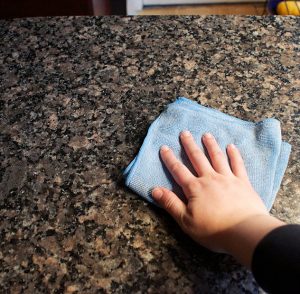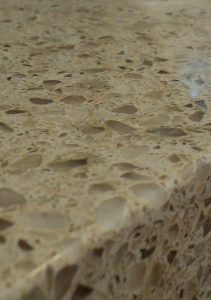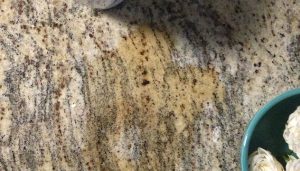Implementing Proper Countertop Maintenance
Granite and quartz countertops can make for a beautiful component to any room, and in order to keep them in top shape, there are a few best practices to follow. Such practices differ depending on your countertop’s material, so make sure that you take the proper actions for your specific surface!
Granite
- For everyday cleaning of your granite countertop, use warm water on a washcloth, ideally microfiber. Soaps and detergents are not recommended to clean stone countertops; they will not damage your surface, but will dull its shiny finish if used repeatedly.
- Make sure your granite countertop is sealed. While granite is a very hard surface and less porous than marble, unsealed or weakly sealed granite will soak up oils and spills, leaving deep stains if they are not quickly wiped up. Nearly all natural stone will stain if spills are left alone for too long, even if they are sealed!
- To check whether your granite is sealed, leave a few drops of water on the surface. If they bead up, you have a secure seal. If the water has soaked into the granite after a few minutes, then it’s time to reseal the stone.
- Avoid using harsh or abrasive cleaners, including Windex, acidic cleaners (e.g. vinegar, lemon, lime), anything with ammonia or bleach, or abrasive sponges. Frequent use of these chemicals will dull and weaken the sealant over time. The harsher the cleaner, the quicker it will break down the sealant.
- It is recommended that you reseal your granite countertops about once per year. Some materials need less frequent re-application, and a good way to tell if yours is overdue is to perform the water drop test described above.


Quartz
(Not to be confused with Quartzite)
- Routine cleaning of a quartz countertop is best done with a damp cloth. Using soaps and/or detergents is not recommended to clean any stone countertops, as repeated use of such cleaners results in a dull surface.
- Though quartz is resistant to staining from wine, tea, coffee, etc, it’s still best to wipe up spills immediately after they occur. For dried spills or heavy stains, your best bet is a glass or surface cleaner, a nonabrasive sponge, and a little elbow grease. If you need a more powerful cleaner, make sure it is specifically designed for use on quartz. Never use abrasives, especially combined with acidic or alkaline cleaners.
- Keep a plastic putty knife handy to gently scrape off dry and hardened substances such as gum, food, or paint. Avoid using scouring pads (or similar), as they can dull the surface.
- Do not use any harsh cleaning solutions at either end of the pH spectrum. Anything high in alkalinity or acidity will break down the surface of your countertop. If any extreme-pH substances come into contact with your top, immediately and thoroughly rinse the exposed surface with water.
- Avoid exposure to extreme heat by using pads if placing anything hot (e.g. cookware) on a quartz countertop.
- Place down a cutting board when using a knife. Quartz is strong, but may still scratch if used directly to cut on.
Stains
- Especially on porous surfaces like granite or marble, removing stains can be a lengthy process.
- Make sure to seal your countertops (if it is necessary for its material type) prior to any potential contact with staining agents. This will give you a much longer time window to take care of spills before running into a problem.
- Prevention is the best method to ensure a stain-free countertop.
- If your countertop does stain, keep track of what substance was spilled. Removal procedures vary depending on the staining agent.
